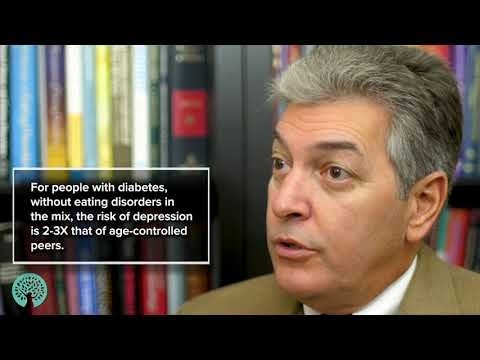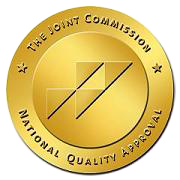
What is diabulimia?
Diabulimia is a term that describes how people with type 1 diabetes may intentionally misuse insulin as a weight-loss tool by:
- Decreasing the prescribed dose of insulin
- Omitting insulin entirely
- Delaying the appropriate dose
- Manipulating the insulin itself to render it inactive
Diabulimia definition
Diabulimia is not a medically recognized term. The medical term describing this condition is dual diagnosis of eating disorder and diabetes mellitus type 1 (ED-DMT1).

Causes of diabulimia
People with diabetes face an increased risk for eating disorders. Like all eating disorders, the cause of diabulimia stems from genetic, biological, psychological and sociocultural factors. Learn more about the causes of eating disorder behaviors in the link below.

Diabulimia signs to watch for
Individuals with diabetes face an increased risk for eating disorders.1 Due to this increased risk, the American Diabetes Association recommends that all individuals with type 1 diabetes be screened regularly for eating disorders. Friends, family and loved ones can learn how to spot the signs to know if someone is struggling with food or their body image. In this section, we explore diabulimia symptoms.
[1] Hanlan, ME, Griffith, J, Patel, N, Jaser, SS. (2013). Eating Disorders and Disordered Eating in Type 1 Diabetes: Prevalence, Screening, and Treatment Options. Current Diabetes Reports.

Diabulimia symptoms
There are a number of clinical signs and symptoms of diabulimia seen in people with type 1 diabetes, including:
- Weight loss
- Growth failure in adolescents
- Poor blood-glucose control (especially if the individual had good control previously)
- Hyperglycemia
- Ketonuria
- Recurrent episodes of diabetic ketoacidosis (DKA); marked by polydipsia (excessive thirst), polyuria (frequent urination) and/or polyphagia (increased hunger)
- Severe recurrent episodes of hypoglycemia
- Higher than usual hemoglobin A1c levels (despite good blood sugar records, which may be falsified by the individual)
- Microvascular disease affecting the eyes, kidneys and heart
- Peripheral neuropathy (weakness, numbness and/or pain in hands and feet)
- Secrecy, abnormal behaviors or rituals around insulin administration
- Disordered eating, including restriction, binge eating, refusal to eat in the presence of others, obsession with weight, body image, exercise and/or food
- Depressed mood, social withdrawal and/or deterioration of school or work performance.
Diabulimia is a serious illness
Manipulating insulin can be life-threatening for people with type 1 diabetes. If you or a loved one need treatment for diabulimia, medical stabilization will be a priority. Once this is achieved, professional care with a multidisciplinary team experienced in the medical, nutritional, and psychological treatment of diabulimia may be warranted. Eating Recovery Centers is the only treatment center in the nation offering diabulimia treatment at all levels of care including inpatient, residential, partial hospitalization, and intensive outpatient programs.
Using insulin to lose weight
Misusing insulin as a way of "purging" calories is a serious matter. People with type 1 diabetes may skip doses of insulin, under dose or omit insulin altogether. When this happens, sugar is eliminated from the body via urination, instead of being stored as fat or used as fuel. The result? The individual loses weight. They can, essentially, “purge” themselves of calories in this manner. Misusing insulin like this may seem like a convenient weight loss tool, but this behavior can cause severe, long-lasting health complications as we describe below.

The danger of misusing insulin
There are a number of risks associated with diabulimia. At its most extreme, diabulimia can increase the risk of premature death. People with type 1 diabetes, engaging in this eating disorder behavior, may experience severe consequences:
- Diabetes complications (including onset and severity of microvascular disease and peripheral nerve damage)
- Hyperglycemia (elevated levels of glucose in the bloodstream) resulting from insulin deficiency and leads to damage of small vessels (microvascular damage) and nerve cells, specifically peripheral nerves
- Damage to the retina of the eye, kidneys and heart (related to microvascular disease)
- Small nerve damage (peripheral neuropathy, pain, tingling, and even numbness of hands and feet
- Ketonuria
- Diabetic ketoacidosis
At the extreme, additional complications can include:
- Damage to the heart
- Damage to the kidney
- Damage to the retina of the eye
- Damage to peripheral nerves
- Increased mortality risk
These serious health risks underscore the necessity to seek specialized treatment for this condition.
Diabulimia treatment
At Eating Recovery Center, we offer a multidisciplinary team approach to treating diabulimia (ED-DMT1). Patients are seen by a medical doctor, psychiatrist, therapist, registered dietitian and nursing staff regularly. The first goals include medical stabilization and weight restoration to address health complications.

Our multi-step approach to treating ED-DMT1 starts with stabilization. As we progress with care, consistency and structure are essential. Primary goals for treatment will include weight restoration, diabetes management and education, nutrition education, and improved physical and mental health. and to avoid acute and chronic diabulimia complications.
Medical stabilization
The first goal is to make sure the patient is medically stable. In severe cases, treatment for diabulimia will require hospitalization. During this phase, we will work to interrupt insulin manipulation and other eating disorder behaviors such as excessive exercise or purging. Medical records and labs are reviewed and outpatient providers are consulted. Nutrition and weight assessments take place. Menus are created with carb counts for all meals and snacks and a treatment plan is created.
Emotional support
Psychological assessment looks at mental stability and eating disorder thoughts and behaviors. Once patients are medically and psychiatrically stable, a structured curriculum of individual, group therapy and experiential therapy helps patients explore the function of the eating disorder as they work to build recovery skills. Recovery skills for diabulimia may include learning how to manage stress and anxiety and how to maintain their recovery following discharge from ERC.
Assume - then resume - care
At the beginning of treatment, staff assume care of all diabetic needs. As the patient stabilizes, diabetic care is managed jointly. Over time, the patient resumes care on their own as they recover. Before patients leave our care, we monitor insulin pump resumption.
Diabulimia Recovery
No matter what your symptoms look like, you deserve to have a peaceful relationship with food and your body. In treatment for diabulimia, a personalized nutritional program will be prescribed for you, based on your unique history and experiences. Once you are medically stable, one of the first goals of treatment will be to normalize eating behaviors and food intake. Over time, as your brain and body heal, you become less preoccupied with food and/or your weight.
Get matched with the exact support you need.
With one conversation, our mental health professionals will help you better understand what you’re going through and what you need.
We will meet you where you are, listen to your story in a therapeutic setting, and match you with the level of support that meets your struggle.
Facts about diabulimia
Diabulimia is a term that describes the manipulation of insulin to control weight by individuals with type 1 diabetes.
The term "diabulimia" is not a medical term but it is a term used by the general population. A more accurate and appropriate term may be Dual Diagnosis of Eating Disorder and Diabetes Mellitus Type 1 (ED-DMT1).

- Having type 1 diabetes puts an individual at increased risk for developing an eating disorder or disordered eating. 1
- As many as 35 percent of young adult women with type 1 diabetes met the criteria for a “sub-threshold” eating disorder (display symptoms of an eating disorder but do not meet the full diagnostic criteria). 2
- As many as 11 percent of young adult women with type 1 diabetes met the criteria for a full-syndrome eating disorder. 2
- These are troubling figures when compared to the incidence of eating disorders among women in general, in which an estimated 0.5 to 3.7 percent of women suffer from anorexia nervosa and an estimated 1.1 to 4.2 percent of women have bulimia nervosa in their lifetime. 2
- 16 percent of males with type 1 diabetes have disordered eating behaviors.3
- The risk of death for ED-DMT1 was 17-fold compared to type 1 diabetes alone and seven-fold compared to anorexia nervosa 4
It’s important to note that people with diabulimia may exhibit any number of eating disorder behaviors — or they may only manipulate their insulin and otherwise have normal eating patterns.
1https://care.diabetesjournals.org/content/38/7/1212
2https://care.diabetesjournals.org/content/15/10/1356
3 Hanlan, M. E., Griffith, J., Patel, N., & Jaser, S. S. (2013). Eating disorders and disordered eating in Type 1 diabetes: prevalence, screening, and treatment options. Current Diabetes Reports, 13(6), 909-916.
4 Mortality in concurrent type 1 diabetes and anorexia nervosa. Nielsen S, Emborg C, Mølbak AG. Diabetes Care. 2002 Feb; 25(2):309-12.
Diabulimia FAQs
What behaviors may be considered diabulimia?
People with diabulimia may:
- Decrease their dose of insulin
- Omit insulin entirely
- Delay their dose of insulin
- Manipulate insulin to make it ineffective
- Engage in other forms of purging, including excessive exercise
Diabulimia is serious and life-threatening but with professional treatment you can successfully overcome this condition.
What are the warning signs of diabulimia?
Know the warning signs of diabulimia in people with type 1 diabetes:
- Obsession with weight loss, dieting or counting calories
- Secret/odd behaviors around insulin administration
- Poor blood-glucose control
- Hyperglycemia or hypoglycemia
- Ketonuria
- Higher than normal hemoglobin A1c levels
- Diabetic ketoacidosis (DKA) with frequent urination and or increased thirst and hunger
How can someone recover from diabulimia?
You can recover from diabulimia with help from experienced diabulimia treatment professionals. In treatment, you can learn how to overcome diabulimia behaviors with multiple interventions, including:
- Medical and psychiatric care
- Individual therapy
- Group therapy
- Family therapy, education and support
- Diabetes and nutrition education and support
- Experiential therapies (yoga, arts)
What are the consequences of diabulimia?
The most extreme consequence of diabulimia is risk of death. Other consequences include:
- Hyperglycemia (high blood sugar)
- Damage to eyes, kidneys or heart (microvascular disease)
- Damage to nerves in hands or feet (pain, tingling, and numbness)
- Ketones in urine
- Diabetic ketoacidosis (DKA)
- Depression, anxiety and other mental health concerns
How do I get help for diabulimia?
Due to the risk of death and serious health complications, it is important to seek help for diabulimia from an experienced team of eating disorder treatment professionals. In treatment, you will work with a team of experts including psychiatrists, psychotherapists, registered dietitians, family and group therapists, and others.
Can diabulimia be deadly?
Researchers have found that diabulimia increases many health complications including an increased risk of early death. One study found that the restriction of insulin with diabulimia is associated with a “threefold increased risk of mortality.” [1] Type 1 diabetes can increase one’s risk of death; diabulimia further increases that risk.
[1] Goebel-Fabbri, A., Fikkan, J., Franko, D., Pearson, K., Anderson, B. & Weinger, K. (2008). Insulin restriction and associated morbidity and mortality in women with type 1 diabetes. Diabetes Care 31(3): 415-419.
Is diabulimia an eating disorder?
Diabulimia is not an official eating disorder or medical term. It is a non-clinical term used to describe eating disorder behaviors that some people with type 1 diabetes use to lose weight. Diabulimia is sometimes referred to as the Dual Diagnosis of Eating Disorder and Diabetes Mellitus Type 1 (ED-DMT1).
Hide Last Child Layout Div


